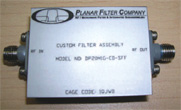
Most typical high pass filters pass frequencies above their specified cut-off frequency with little or no attenuation and then start to attenuate frequencies below the cut-off frequency in a continuous slope depending on the configuration of the filter. Little attention is paid to the characteristics of the stop band other than to make sure it is below a predetermined level. A new requirement was recently placed on the high pass filter’s stop band performance to meet a specific military requirement. The new filter’s attenuation band had to be controlled and set to a specific attenuation level. Thus, a relatively simple high pass filter suddenly became more complicated.
This particular filter was designed with a high pass band of 470 MHz to 1 GHz while the stop band is 10 to 470 MHz and has approximately –23 dB of rejection over the full stop band. In addition, the VSWR over the full 10 MHz to 1 GHz operating band was specified at 2.0:1 maximum.
The new filter is currently being used as a gain equalizer in a military aircraft system, providing gain correction over the full operating band. The particular system problem was that at frequencies below 450 MHz there was a specific amount of additional gain. This excess gain from 20 to 450 MHz had to be attenuated while not interfering with the gain level above 450 MHz.

The resulting filter’s insertion loss and return loss is shown in Figure 1. The actual specification for the military application was from 20 MHz to 1 GHz with an insertion loss meeting a particular specified profile, and with an input and output VSWR of 2.3 maximum over the entire 20 MHz to 1 GHz operating band. As can be seen in the data plots, the attenuation level in the stop band remained constant to within 2 dB and the VSWR easily remained 2:1 or below.
Although this particular filter was designed and delivered for a specific military requirement, the product design is easily adapted to similar frequency ranges and applications, military or commercial. Other frequency ranges and attenuation levels are available upon request.
Planar Filter Co.,
Frederick, MD
(301) 662-5019,
www.planarfilter.com.
